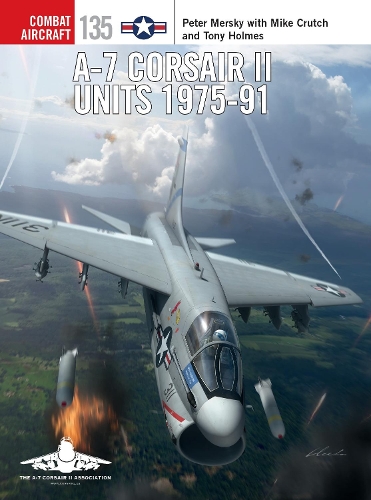
A-7 Corsair II Units 1975-91
(Paperback)
Publishing Details
A-7 Corsair II Units 1975-91
By (Author) Peter Mersky
Illustrated by Jim Laurier
Illustrated by Gareth Hector
Contributions by Tony Holmes
Contributions by Mike Crutch
Cover design or artwork by Gareth Hector
Bloomsbury Publishing PLC
Osprey Publishing
1st June 2021
18th February 2021
United Kingdom
Classifications
General
Non Fiction
Air forces and warfare
Military vehicles and transport of air, land and sea
623.7463
Physical Properties
Paperback
96
Width 182mm, Height 246mm, Spine 8mm
314g
Description
At the A-7 Corsair IIs peak in the mid-1980s, some 30 US Navy squadrons flew various versions of the aircraft, including six Naval Air Reserve units, and these many of these units saw action across the Middle East. By the time the jet saw combat in Operation Desert Storm (1991), there remained only two fleet squadrons many fleet squadrons having either disestablished or transitioned to the F/A18 Hornet but both of these units (VA-46 and VA-72) played a major role in the campaign to free Kuwait. The book details the technological development and improvements that were introduced to the airframe post-Vietnam (the FLIR targeting pod from 1979 and AGM-88 HARM missile from 1983 being the most important), and how they shaped operational employment of the aircraft. The jets combat experiences in conflicts during the 1970s (Cambodia), 1980s (Lebanon, Grenada, Libya and Iran), and 1990s (Iraq) are explained in detail, and Peter Merskys expert analysis is supported by numerous first-hand accounts from naval aviators that saw action with the A-7 during these campaigns.
Author Bio
Peter B. Mersky has written 16 books and numerous magazine articles concentrating on modern combat aircraft and the Vietnam War. He has written six previous Osprey titles, four of which have focused on the US Navys and Marine Corps use of the F8 Crusader and one on the A-7 Corsair II in Vietnam (COM 48). His last COM (69) was on the A-4 in Vietnam. Another of his books was the first English account on Israeli fighter aces (Specialty Press, 1997), and it was the first such volume to be published outside of Israel. Another of his books, a history of US Marine Corps aviation, now in its fourth edition (Naval Institute Press, 2009), has sold more than 20,000 copies. Jim Laurier is a native of New England, growing up in New Hampshire and Massachusetts. He has been drawing since he could hold a pencil and throughout his life, he has worked in many mediums creating artwork on a variety of subjects. He has worked on the Osprey Aviation list since 2000 and in that time, he has produced some of the finest artwork seen in these volumes. He has specialised in aircraft of the Vietnam War period. He did the profiles for the previous book on A-7s in Vietnam.
